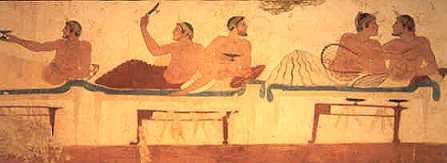 About the Series
About the Series
In the last post, I discussed some ways seminaries and colleges could accommodate an immersive approach to Greek pedagogy in their curricula and begin to approach the amount of training students receive in modern language programs, or ideally, the amount of class-time we know to be necessary in order to develop real fluency in a language. In this post, I want to discuss what kind of support structure an immersive approach to Greek would require.
Introduction
In my post on modern language programs, I pointed out that, in addition to an extensive curriculum, such programs enjoy an extensive support structure. I want to look at five ways a seminary or college could develop something similar for a Koine Greek program.
1. Faculty Training
Faculty in modern language programs are fluent in their language of focus. Most of the time, they are native speakers, who also speak English as a second language. Obviously, native speakers are not available to teach Koine Greek (but, see here for a possible solution). But, that lack is not the real problem. The real problem is that Greek faculty currently have virtually zero communicative ability in the language. Trained in the grammar-translation tradition, they perpetuate the same, and do not approach the language as a real language, a vehicle for communication. Even those who are convinced of the value of a communicative approach lack the skills and resources to pursue it.
What we need, then, is widely available teacher training in a) communicating in Greek and b) communicative teaching methods. A good course could do both at the same time, as it would teach faculty to communicate in Greek, while also modeling the methods for developing communicative proficiency. See here for an example of such training that took place during the summer. We need a lot more of these and much more than just a week! Without proficient faculty, the elements below are worthless.
2. Greek Language Lab
Every modern language program has a dedicated language lab with up-to-date technology, software, and videos geared to developing fluency in the language at different stages of learning. While we are lacking in the media department right now, a basic language lab would not be too difficult for any school to put together immediately. Here’s all you need:
- A dedicated room, with comfortable chairs, couches, or bean bags and a few game tables, perhaps. Don’t make it look like a traditional classroom—the idea is to create a relaxed atmosphere.
- A bunch of props: figurines, stuffed animals, dollhouses, other toys. These can be labeled in Greek and used in storytelling.
- Games: Μονοπώλιον, Κίνδυνος (Jeopardy, μετὰ διπλοῦ κινδύνου), ᾿Ιατρεῖον (Operation, great for body parts), Ἕνα (Uno), Βίος, Μῖμος (Charades), etc. For some of these, you will need to translate the board, while for others you can just provide instructions in Greek along with a list of the basic vocabulary to play the game.
- Phrasebooks: Just like you would pick up if you were going to ancient Alexandria on vacation. See here for an example.
 Lots of easy Greek reading. This would need to be developed, of course, from ABC/1-2-3 books, to 1000 words, to Dick/Jane, to Curious George, on up to Aesop, Harry Potter, etc.
Lots of easy Greek reading. This would need to be developed, of course, from ABC/1-2-3 books, to 1000 words, to Dick/Jane, to Curious George, on up to Aesop, Harry Potter, etc.- Everything in the room should be labeled in Greek (wall, floor, light, window, door, etc).
- Lexical resources: Picture dictionaries, English to Greek dictionaries, Greek lexica (BDAG, LSJ, Lampe), Greek to Greek lexica (Suda, Hesychius).
- Tons of Flashcards, sorted according to subject (e.g. colors, numbers, family, κτλ). It would be good if they could be digital, incorporating pictures and audio.
- Grammar resources for checking out a specific construction. Perhaps a good list of idioms.
- Audio resources: recordings of the NT and LXX in Greek. Audiolingual-style recorded drills. Lots of songs, with lyric sheets! Short videos, made by faculty/students could also be collected here.
- A few computer stations with Greek keyboards–for the software that we do currently have (such as flashcard programs, online dictionaries for finding Greek words, and a web browser for Skype conversations). I have a post planned on some of the software that needs to be developed.
3. Greek Club
Why doesn’t every seminary have a Greek club—it’s inexplicable and inexcusable?! Greek club would be a time when students could gather together regularly for extracurricular activities to provide them a chance to use the language in a relaxed atmosphere. Virtually any activity could work: ἄριστα or δεῖπνα where students could eat in Greek, game nights, etc. The Greek club should also plan plays or–especially appropriate at a seminary–Christmas or Easter pageants, Passover dinners, Psalm singing, etc. ὁ οὐρανός is the limit!
 4. A Year Abroad?
4. A Year Abroad?
Obviously, students can’t spend a year abroad in Ancient Greece, not yet, anyway. But, they could spend a semester, or even 1-2 months in an immersive Greek experience at a camp or training site dedicated to teaching the language. Randall Buth already has something like this on a smaller scale (see here for his Hebrew offerings, which are more extensive).
 5. Greek House!
5. Greek House!
No, not what you’re thinking. Bluto Blutarsky need not apply, though a τήβεννα party might not be out of the question. Here’s the idea: other colleges have houses where only language majors live and any language other than the target language is expressly verboten. See, for example, Grinnell College’s language houses. Do you get the feeling this school is serious about language learning? Yeah. Where are all the seminary language houses? Oh, yeah, here they are. ![]()
Conclusion
I think this will be the last post in this series, though future posts will continue to deal with pedagogy. Next up, perhaps: 10 resources we need right now to facilitate communicative Greek teaching! Stay tuned!







Dear Daniel,
Thank you so much for your thoughtful posts on this important topic. I could not agree more with your criticisms of the current situation. Your challenge to teach and learn Hellenistic Greek as a living language is most welcome indeed.
I just wonder whether you might be drawing too sharp a contrast between Hellenistic Greek and Modern Greek? Perhaps not, but you have not discussed the value of contemporary native speakers of Greek or the value of an immersive experience in modern day Greece. Caragounis, for instance, has argued that Hellenistic Greek and Modern Greek are simply two phases of the same language and that there is a great deal of continuity between these phases (esp. in terms of pronunciation and vocabulary). What do you think of this? Obviously, there are also differences, which need to be factored in, but I am just wondering whether or not, and to what extent, you think the Greek of today (and its speakers) can facilitate teaching and learning Hellenistic Greek as a living language?
Jody
Caragounis is correct that they are two phases of the same languages. The problem is that they’re not two phases that are directly beside each other. There is Byzantine Greek and Medieval Greek between them as well.
Syntax, in particular, has had a number of dramatic changes and the languages are not as mutually intelligible as they could be.
Jody, I’m very open to the possibility that I draw too sharp a contrast between Modern Greek and Koine. I’m willing to be corrected. I find myself impressed by two different realities I’ve encountered with Modern Greek. On the one hand, I’m impressed by how much vocab is shared between the two (adjusting for a few morphological shifts). On the other hand, I’m impressed by the fact that contemporary Greeks use translations, often that are quite different from the Koine.
Here’s an example from Heb 4:12 —
Modern: Γιατί είναι ζωντανός ο λόγος του Θεού και ενεργητικός και κοφτερότερος περισσότερο από κάθε δίκοπη μάχαιρα και διεισδύει μέχρι το χωρισμό της ψυχής και του πνεύματος, των αρθρώσεων και των μυελών των οστών, και κρίνει τις σκέψεις και τους στοχασμούς της καρδιάς
NT: Ζῶν γὰρ ὁ λόγος τοῦ θεοῦ καὶ ἐνεργὴς καὶ τομώτερος ὑπὲρ πᾶσαν μάχαιραν δίστομον καὶ διϊκνούμενος ἄχρι μερισμοῦ ψυχῆς καὶ πνεύματος, ἁρμῶν τε καὶ μυελῶν, καὶ κριτικὸς ἐνθυμήσεων καὶ ἐννοιῶν καρδίας
One of the big differences is the syntax (participial vs finite), but there is a lot of overlap. I can read and understand the modern easily (of course I know the passage), but evidently modern speakers struggle with the Koine. I wonder how representative the modern translation even is of normal spoken Greek on the streets.
I just have to mention that the ancient Greek edition of Harry Potter is listed on Amazon (with the added label “Bargain Price Edition”) at a mere $237.88.
Immersion language learning is best, but not always cheap! 🙂
When I wrote the post, there was a copy for around $20, so someone may have snapped that up! For those interested in procuring a copy, there are several for reasonable prices on Fetchbook (http://www.fetchbook.info/compare.do?search=9780747568971).
Sorry about that. It was probably me. By a strange twist of fate, I ordered a copy the evening of the 28th, before your post went up.
At any rate, Amazon actually has TWO entries for this book. The one listed as “Bargain Price” actually has the more expensive books. The one listed as “Import” has cheaper copies. Check it out:
I’ve been working on my Koine Greek. (I had two years in seminary, but now I’m out.) Recently, I became aware of the “Living Koine” movement, and have been working through Randall Buth’s material (part one).
However, I find myself lacking “comprehensible input.” Sure, I can read John, but that only goes so far. Susan Gross (referencing Krashen) claims that free reading is even more efficient, hour per hour, than classroom time. But I can’t find the kind of low-level comprehensible input I need. I bought Colwell & Tune, but that didn’t seem to be what I was looking for. Hale had some interesting narratives/dialogues, but they weren’t enough.
Then, I stumbled onto some Attic Greek material. What a treasure trove! Athenaze, JACT, Ancient Greek Alive, not to mention all the free stuff online – Rouse’s “A Greek Boy at Home,” everything listed on Ed Donnelly’s site, everything listed on Spiphanies’ site!
I tried reading some of these works, but the vocabulary is almost completely different from my NT Greek class. In addition, Attic Greek seems to be more complicated than Koine (optatives, dual, etc.). In short, I’m thinking about abandoning Koine for Attic for the time being, just to build my fluency. (Well, not *just* for that – I would also enjoy reading widely in Attic. But my main concern is Koine.)
Given the current available resources, how advisable do you think this is?
Mark, you’ve pinpointed a huge lack in our resources at the moment. I agree with Krashen and Gross on the role of free reading. Krashen’s pet example of free reading was a study involving kids reading Sweet Valley High books (5th/6th grade reading level). Unfortunately, that is way too advanced for most Greek readers! We need graded reading at a kindergarten, 1st, 2nd, 3rd grade and so on level. By the time you get to a 6th grade reading level, you have a pretty large passive vocabulary (around 8000-10000 “word families” on most estimates!), much larger (especially for concrete words) than most Greek readers possess.
I wouldn’t abandon Koine for Attic (and, in some ways, that’s a false choice anyway–more literary Koine writers would be just as challenging). I would just try more active approaches to vocab acquisition. Once you’ve understood the basic grammar, the vocab is the big hump to get over for reading fluency. I’ll be posting on this topic pretty soon, hopefully, but those are some preliminary thoughts. Thanks for commenting!
Have you posted on this topic? I was looking around for a post on vocabulary acquisition, but I didn’t find it yet.
If you’re referring to the series on resources we need, check out https://danielstreett.com/tag/needed-resources/
I love your ideas. These are the strategies used in ESL classrooms with Centers/ Work Stations. I am working on a materials that includes these for Biblical Greek, but what you mentioned gave me more to think about. Thank you for sharing.
Pingback: Taking Language-learning Seriously. « Todd Borger
I thought that you might be interested to know, if you don’t already, that four of the Asterix comics have been translated into Ancient Greek and are sold in Greece by Mamouth Comics. They can be ordered from some of the larger online Greek booksellers (if you can afford the shipping).
Yes, I have several of them. You can probably find a pdf of them online if you look hard enough.
Sir Daniel, I have successfully “wasted” the last couple hours working through your series and links. This wasn’t my intent, but I stumbled upon your blog this evening (and glad I did) thanks to http://www.greek-language.com/Home.html. There was a link somewhere there.
Honestly, this series is great and I can relate. I am currently a senior at Life Pacific College majoring in Biblical Studies. If you’ve heard of it, I’d be surprised. Most haven’t. It’s a small Bible college.
I took a one semester Greek coarse; a tools-oriented approach for sure. Many friends are currently enrolled. I remember thinking in class that I had no idea how to pronounce the Greek words in the passages we were studying. I didn’t think it a huge deal at the time. I am grateful for my professor and the class overall, though your series has got me thinking and, quite frankly, has pumped me up for Greek studies!
I don’t want to be dependent on tools. I want to be able to read it! I haven’t explored too much more of your blog so I don’t know if you recommend good additional resources, but I would love to take my Greek studies to the next level (my skills are a bit little rusty and knowledge is somewhat blurry to be honest). I don’t know if you could point me in a direction. Any advice at this point would be greatly appreciated.
Thanks for the posts!
Nick
Nick, I’m glad to have facilitated your “time-wasting.” What else is Christmas break for than “wasting time” reading what you want to instead of what you have to? 🙂 I have heard of Life Pacific, but I don’t know any faculty there.
I am working on a post that would give a bunch of ideas on how you can start acquiring Greek (or other “dead” languages) when you don’t have the means or opportunity to attend a course that uses living language methods. It might be a while till the post gets written, though, since I am grading now and have a lot of other writing to do over the break.
Thanks for reading and commenting!
Pingback: Some New Koine Greek Videos | καὶ τὰ λοιπά
Pingback: Old School | The Library Basement
We are preparing to begin teaching Greek in a 3rd world context with the goal of launching a Masters/Ph.D. program in N.T. I profoundly feel that students need to master the language, but we could never offer the kind of immersion experience you suggest. Since I did not move overseas until my 50’s, I was forced to “catch as catch can” the language, with a teacher several times a week. After 7 years, I still have not mastered the language. Why then would I expect students in N.T. Greek to master Greek in a similar situation?
My experience has been, however, that listening is key to putting my grammar and vocabulary to work. Speaking then reinforces the listening. Taking that “dare” of actually saying out loud what I am thinking burns the correct way to say things into my psyche. I personally see a threefold way of learning a language in a context where I cannot work full time on it. There is the information side of it (vocab, grammar), the immersion-hearing side of it (where I learn how the grammar and vocab is being used by native speakers as they talk to one another–not to me!) and then the practice side of it, where I converse with people. The practice side of it is only helpful once I have enough grammar and vocab to say things correctly.
Amazing! As a self learner I’ve been arranging my apartment in exactly this way, right down to the Aesop and Harry Potter books!!-and an Roman eagle-SPQR banner on the wall (yeah, it should be a Byzantine double headed eagle, but it does look pretty cool.)
BTW I’ve found a set of YouTube sites of Thucydides in restored classical pronunciation read by an native Greek speaker. (‘shouldn’t be hard to find.) After the JACT ‘Reading Greek’ CD, this sounds like fine music. It’s great for “mental emersion” learning.
Ευχάριστο πολύ. Υγιεια σοι!
GV